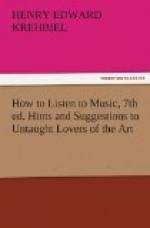[Sidenote: The opera defended as an art-form.]
[Sidenote: The classic tragedy.]
Now the present generation has witnessed a revolution in operatic ideas which has lifted the poetical elements upon a plane not dreamed of when opera was merely a concert in costume, and it is no longer tolerable that it be set down as an absurdity. On the contrary, I believe that, looked at in the light thrown upon it by the history of the drama and the origin of music, the opera is completely justified as an art-form, and, in its best estate, is an entirely reasonable and highly effective entertainment. No mean place, surely, should be given in the estimation of the judicious to an art-form which aims in an equal degree to charm the senses, stimulate the emotions, and persuade the reason. This, the opera, or, perhaps I would better say the lyric drama, can be made to do as efficiently as the Greek tragedy did it, so far as the differences between the civilizations of ancient Hellas and the nineteenth century will permit. The Greek tragedy was the original opera, a fact which literary study would alone have made plain even if it were not clearly of record that it was an effort to restore the ancient plays in their integrity that gave rise to the Italian opera three centuries ago.
[Sidenote: Genesis of the Greek plays.]
Every school-boy knows now that the Hellenic plays were simply the final evolution of the dances with which the people of Hellas celebrated their religious festivals. At the rustic Bacchic feasts of the early Greeks they sang hymns in honor of the wine-god, and danced on goat-skins filled with wine. He who held his footing best on the treacherous surface carried home the wine as a reward. They contended in athletic games and songs for a goat, and from this circumstance scholars have surmised we have the word tragedy, which means “goat-song.” The choric songs and dances grew in variety and beauty. Finally, somebody (tradition preserves the name of Thespis as the man) conceived the idea of introducing a simple dialogue between the strophes of the choric song. Generally this dialogue took the form of a recital of some story concerning the god whose festival was celebrating. Then when the dithyrambic song returned, it would either continue the narrative or comment on its ethical features.
[Sidenote: Mimicry and dress.]
The merry-makers, or worshippers, as one chooses to look upon them, manifested their enthusiasm by imitating the appearance as well as the actions of the god and his votaries. They smeared themselves with wine-lees, colored their bodies black and red, put on masks, covered themselves with the skins of beasts, enacted the parts of nymphs, fauns, and satyrs, those creatures of primitive fancy, half men and half goats, who were the representatives of natural sensuality untrammelled by conventionality.
[Sidenote: Melodrama.]




